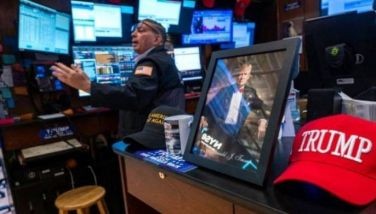Gov’t sees 4.2% growth this year
October 9, 2003 | 12:00am
The country is expected to post a moderate growth this year after earning a ratings downgrade from Moody’s over political concerns and acknowledged that the prospects for 2004 depend very much on May’s presidential election.
National Economic and Development Authority (NEDA) Director General and Socioeconomic Planning Secretary Romulo Neri said yesterday that global recovery should help the country attain a 4.2 percent economic growth this year but 2004 depends on the outcome of the elections.
Gross domestic product (GDP) was likely to have grown between 3.8 and 4.3 percent for the three months to September after a 3.9 percent rise in the first half, he said.
The government earlier set a full-year GDP growth target of 4.2-5.2 percent.
Growth should pick up further to between 5.2 percent and six percent in 2004 although it will be dependent on the "results of the political exercise next year," Neri added.
President Arroyo announced last weekend that she would seek a six-year term, calming businessmen worried by uncertainty over the presidential succession after she earlier had said she would not seek reelection.
Moody’s Investors Service last week downgraded the outlook on the Philippine key sovereign foreign currency ratings to "negative" from "stable," citing political risks ahead of the May 2004 vote.
The US ratings agency said that a continued deterioration in the political climate could weaken further the country’s external payments position.
The government narrowly avoided a recession in the second quarter of the year.
The Arroyo administration survived a right-wing military revolt on July 27, which the President alleged was financed by certain segments of the political opposition. The rebellion, along with money-laundering allegations against First Gentleman Mike Arroyo has pulled down Mrs. Arroyo’s poll ratings.
"The upturn for the second half of the year is due to the recovery taking place in US and Japan, along with Europe. Also Asian economies are recovering from the impact of SARS (Severe Acute Respiratory Syndrome)," Neri said.
The key electronics sector "will also strengthen with demand picking up Gov’t seeks and inventories drawn down," while the easing of an El Nino dry spell will also prop up agriculture production, he added.
Agricultural should expand by between 3.7 percent and 4.7 percent next year, while the manufacturing and construction sectors will gain ground on stronger exports.
Industrial growth next year should be between 4.5 percent and 5.4 percent, he added.
Neri said the services sector should also expand vigorously by between 5.6 percent and 6.6 percent as telecommunications, trade, and private services continue to perform well.
"The financial sector will grow as bank lending improves in the wake of better corporate balance sheets and the reduction in non-performing loans," he said.
On the demand side, growth in 2004 will hinge on the continued strength of private consumption and private investment, which will complement government investment spending.
"Consumption will improve given the election-related spending and the stronger growth of agriculture which will boost rural incomes. Investment, on the other hand, will gain ground with the pick-up in housing as well as the expansion of retailers and food establishments," Neri said.
The NEDA chief also noted that the 2004 growth will also be boosted by the investment in new equipment by the industry such as the semiconductors, telecommunications, automotive and sugar milling.
He said inflation should average between four and five percent next year, lower than the 4.5 percent to 5.5-percent government forecast for 2003.
National Economic and Development Authority (NEDA) Director General and Socioeconomic Planning Secretary Romulo Neri said yesterday that global recovery should help the country attain a 4.2 percent economic growth this year but 2004 depends on the outcome of the elections.
Gross domestic product (GDP) was likely to have grown between 3.8 and 4.3 percent for the three months to September after a 3.9 percent rise in the first half, he said.
The government earlier set a full-year GDP growth target of 4.2-5.2 percent.
Growth should pick up further to between 5.2 percent and six percent in 2004 although it will be dependent on the "results of the political exercise next year," Neri added.
President Arroyo announced last weekend that she would seek a six-year term, calming businessmen worried by uncertainty over the presidential succession after she earlier had said she would not seek reelection.
Moody’s Investors Service last week downgraded the outlook on the Philippine key sovereign foreign currency ratings to "negative" from "stable," citing political risks ahead of the May 2004 vote.
The US ratings agency said that a continued deterioration in the political climate could weaken further the country’s external payments position.
The government narrowly avoided a recession in the second quarter of the year.
The Arroyo administration survived a right-wing military revolt on July 27, which the President alleged was financed by certain segments of the political opposition. The rebellion, along with money-laundering allegations against First Gentleman Mike Arroyo has pulled down Mrs. Arroyo’s poll ratings.
"The upturn for the second half of the year is due to the recovery taking place in US and Japan, along with Europe. Also Asian economies are recovering from the impact of SARS (Severe Acute Respiratory Syndrome)," Neri said.
The key electronics sector "will also strengthen with demand picking up Gov’t seeks and inventories drawn down," while the easing of an El Nino dry spell will also prop up agriculture production, he added.
Agricultural should expand by between 3.7 percent and 4.7 percent next year, while the manufacturing and construction sectors will gain ground on stronger exports.
Industrial growth next year should be between 4.5 percent and 5.4 percent, he added.
Neri said the services sector should also expand vigorously by between 5.6 percent and 6.6 percent as telecommunications, trade, and private services continue to perform well.
"The financial sector will grow as bank lending improves in the wake of better corporate balance sheets and the reduction in non-performing loans," he said.
On the demand side, growth in 2004 will hinge on the continued strength of private consumption and private investment, which will complement government investment spending.
"Consumption will improve given the election-related spending and the stronger growth of agriculture which will boost rural incomes. Investment, on the other hand, will gain ground with the pick-up in housing as well as the expansion of retailers and food establishments," Neri said.
The NEDA chief also noted that the 2004 growth will also be boosted by the investment in new equipment by the industry such as the semiconductors, telecommunications, automotive and sugar milling.
He said inflation should average between four and five percent next year, lower than the 4.5 percent to 5.5-percent government forecast for 2003.
BrandSpace Articles
<
>
- Latest
- Trending
Trending
Latest
Trending
Latest
Recommended




























